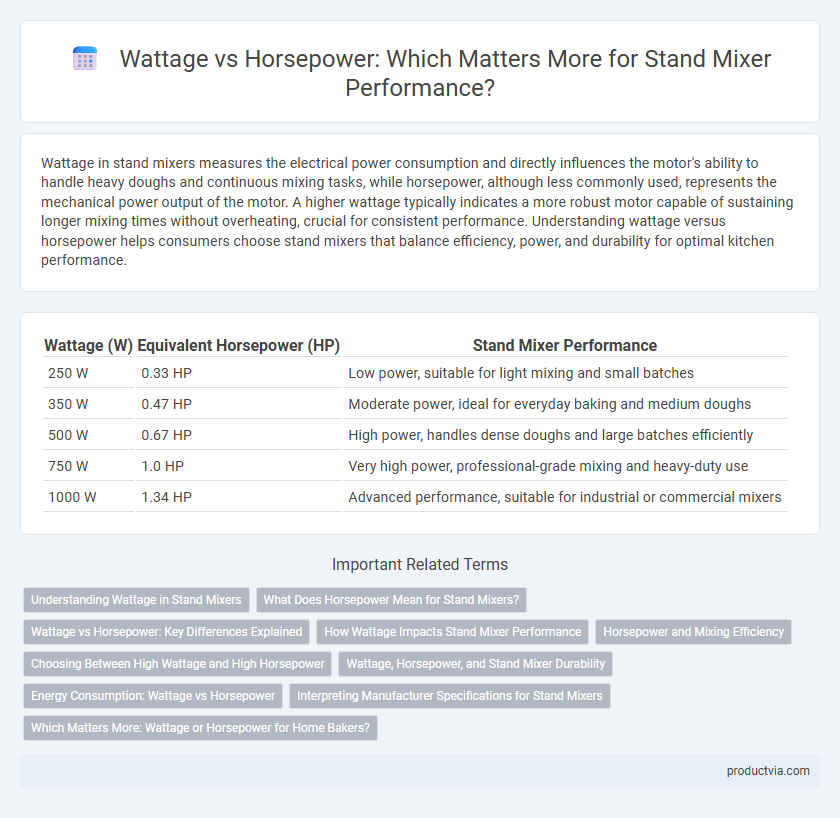Wattage in stand mixers measures the electrical power consumption and directly influences the motor's ability to handle heavy doughs and continuous mixing tasks, while horsepower, although less commonly used, represents the mechanical power output of the motor. A higher wattage typically indicates a more robust motor capable of sustaining longer mixing times without overheating, crucial for consistent performance. Understanding wattage versus horsepower helps consumers choose stand mixers that balance efficiency, power, and durability for optimal kitchen performance.
Table of Comparison
| Wattage (W) | Equivalent Horsepower (HP) | Stand Mixer Performance |
|---|---|---|
| 250 W | 0.33 HP | Low power, suitable for light mixing and small batches |
| 350 W | 0.47 HP | Moderate power, ideal for everyday baking and medium doughs |
| 500 W | 0.67 HP | High power, handles dense doughs and large batches efficiently |
| 750 W | 1.0 HP | Very high power, professional-grade mixing and heavy-duty use |
| 1000 W | 1.34 HP | Advanced performance, suitable for industrial or commercial mixers |
Understanding Wattage in Stand Mixers
Wattage in stand mixers directly indicates the motor's electrical power consumption and is a key factor in determining overall performance efficiency. Higher wattage typically translates to stronger torque and better capability to handle dense or large batches of dough without strain. Unlike horsepower, which measures mechanical power output often used in automotive contexts, wattage provides a more accurate reflection of the motor's ability to sustain consistent mixing speed and power in kitchen appliances.
What Does Horsepower Mean for Stand Mixers?
Horsepower in stand mixers represents the motor's power output, indicating its ability to handle heavy doughs and dense mixtures efficiently. Unlike wattage, which measures electrical consumption, horsepower directly reflects the mechanical strength and torque of the mixer. Higher horsepower ensures consistent performance and durability for demanding baking tasks, making it a key factor in mixer performance.
Wattage vs Horsepower: Key Differences Explained
Wattage measures electrical power consumption in stand mixers, while horsepower quantifies mechanical power output, with 1 horsepower equaling 746 watts. Stand mixers typically display wattage to indicate motor strength, which directly affects mixing efficiency and speed. Understanding the conversion between wattage and horsepower helps consumers assess mixer performance more accurately and choose models suited to heavy-duty or frequent use.
How Wattage Impacts Stand Mixer Performance
Wattage directly affects a stand mixer's motor power and its ability to handle heavy doughs or large batches, with higher wattage typically providing more consistent mixing speed and torque. Unlike horsepower, which is a traditional motor power measurement, wattage specifically indicates electrical consumption and efficiency, allowing for more precise performance expectations in stand mixers. Consumers should look for mixers with watt ratings between 300 to 1000 watts to ensure effective mixing without motor overheating or performance loss.
Horsepower and Mixing Efficiency
Horsepower in stand mixers directly correlates with motor strength, influencing the appliance's ability to handle dense doughs and large batches efficiently. Unlike wattage, which measures electrical power consumption, horsepower provides a clearer indication of the mixer's mechanical output and torque. Higher horsepower typically translates to superior mixing efficiency, consistent performance under heavy loads, and reduced motor strain during prolonged use.
Choosing Between High Wattage and High Horsepower
Wattage in a stand mixer primarily indicates the electrical power consumption, impacting the motor's ability to handle heavy doughs and prolonged mixing tasks efficiently. Horsepower reflects the motor's mechanical power output, influencing torque and the mixer's performance under load, especially for dense ingredients. Selecting a stand mixer requires balancing wattage for consistent power delivery and horsepower for optimal torque to ensure efficient mixing across various recipes.
Wattage, Horsepower, and Stand Mixer Durability
Stand mixer performance is often measured in wattage rather than horsepower, with wattage providing a more accurate representation of the motor's power and efficiency. Higher wattage indicates stronger torque and better ability to handle dense doughs, contributing directly to the stand mixer's durability and longevity under heavy use. While horsepower may offer a comparative measure, wattage remains the key metric for evaluating continuous motor performance and overall stand mixer reliability.
Energy Consumption: Wattage vs Horsepower
Wattage directly measures a stand mixer's electrical power consumption, indicating how much energy the appliance uses during operation, while horsepower relates to the mechanical power output of the motor. Lower wattage models consume less electricity but may deliver reduced mixing power compared to higher wattage units, which can handle dense doughs and heavier tasks efficiently. Understanding the wattage-to-horsepower ratio helps in selecting a stand mixer that balances energy efficiency with performance needs.
Interpreting Manufacturer Specifications for Stand Mixers
Understanding wattage and horsepower in stand mixer specifications helps gauge motor power and mixing efficiency; wattage indicates electrical consumption while horsepower reflects mechanical strength. Most stand mixers list wattage, with typical models ranging from 250 to 1000 watts, correlating to roughly 0.3 to 1.5 horsepower, crucial for handling dense doughs or large batches. Interpreting these figures allows consumers to select mixers matched to their cooking needs, balancing energy use with performance durability.
Which Matters More: Wattage or Horsepower for Home Bakers?
Wattage is a more practical measure for stand mixer performance, as it directly reflects the electrical power consumption and motor strength relevant to kneading and mixing tasks. Horsepower, while a traditional unit of power, often provides less precise information for home bakers since many stand mixers use fractional horsepower ratings that can be misleading. Prioritizing wattage helps home bakers choose mixers capable of handling dense doughs and lengthy mixing without overheating or stalling.
Wattage vs Horsepower for stand mixer performance Infographic

 productvia.com
productvia.com